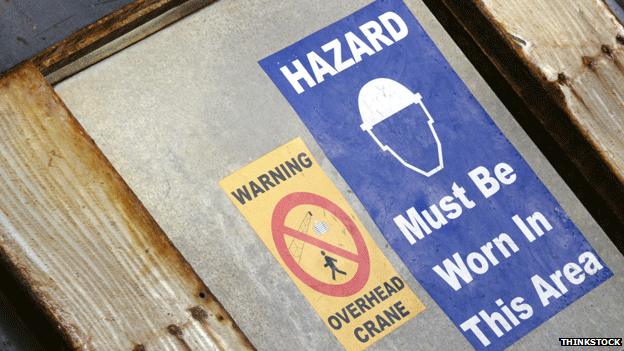Scotland Decides: Profit or loss?
- Published

One side has a letter with 130 signatories, who together employ 50,000 people. The other responds with 200 names, and they employ, well, quite a few as well.
One side says the case for independence has not been made. The other says "oh yes it has".
But it's not just panto.
"Yes" supporters have a big dinner with Alex Salmond as guest speaker, making the case for supporting growth using those levers of an independent nation's power.
The Confederation of British Industry hosts David Cameron at its annual Glasgow dinner, bringing a message of "openness versus narrowness: great advantages versus the great unknown".
From the sidelines, cheerleading commentators blast business leaders for being arrogant, self-serving, out-of-touch - (except, of course, for those who agree with them).

What are the issues of the referendum?

As the people of Scotland weigh up how to vote in the independence referendum, they are asking questions on a range of topics.
But what issues are important to you? Explore our special Scotland Decides website, where you find more on the economy; energy; pensions; citizenship; relations with the rest of the UK; EU membership; defence and broadcasting.

This battle of endorsements was a predictable part of the debate.
Big names from outside politics were among the most important elements in gaining the momentum towards the SNP's election victory in 2007.
In the days when RBS was still riding high, the endorsement by its former chairman and chief executive, Sir George Mathewson, was a vital moment in building credibility.
It doesn't feel like this bit of the "indyref" struggle has the same impact. Few names offer much "wow" factor. Perhaps the biggest surprise is that they've been willing to put their heads above the parapet in this heated political environment.
Business-people won't want to alienate customers, or their employees, or to alarm shareholders that perhaps they're taking their eye off the earnings-to-share price ratio.
'Wealthy country'
But beyond the signing of letters and the counting of employees, what about the arguments they're making? Both letters offer the negative and the positive.
The "Yes"-supporting letter is negative in attacking Westminster for being short-termist rather than strategic, for tax raids on oil companies and pension funds, and for threatening an exit from the European Union.

It's more positive in saying independence offers the opportunity for a culture of innovation and endeavour, where entrepreneurs can be recognised as wealth-creators.
On the pro-Union side, the signatories talk about uncertainty over currency, tax regulation, pensions, EU membership and export promotions. They also talk up the current state of Scotland's economy, with growth, investment and high employment rates.
And that's one of the odd bits of this independence debate. Both sides point to the strengths of the Scottish economy more than the weaknesses. "Yes Scotland" continues to highlight the message that Scotland is "a wealthy country".
Let's not dwell on the fact that it's citing statistics on income rather than wealth, and observe that the same evidence points in opposite directions...
either Scotland's economically strong enough to be independent
or it's economically strong because it has been well served by being part of the UK.
Of course, they're talking about the environment for business. So what about the policies that could, as Alex Salmond put it to Alistair Darling last Monday, help create jobs?
Alex Salmond: "This is our time, it's our moment, let us do it now"
Alistair Darling: "This is a decision for which there is no turning back"
When you look at the policies on offer for business, comparing the Scottish government's White Paper, external on independence with the current policies pursued at Westminster, there are large areas where there is not much difference.
For instance, the SNP administration talked in its recent "Re-industrialising Scotland" paper, external about using the policy levers available through independence to focus on strengthening manufacturing, promoting innovation and encouraging international trade and investment.
The coalition government at Westminster can sign up to that, as could its Labour rivals.
In more detail, there's talk of.....
an innovation agency
a business development bank
a long-term target for more manufacturing output
a more efficient tax system with targeted tax breaks for business
linking skills to industrial priorities
encouraging more collaboration
and an international network for export promotion.
Not much disagreement on any of that from parties at Westminster. So unless you follow the non-SNP, more radical voices in the "Yes" camp, at least part of the choice in the referendum seems to be who can implement similar policies, with a better outcome for Scotland.


A referendum on whether Scotland should become independent is to take place
People resident in Scotland will be able to take part in the vote, answering the "yes/no" question: "Should Scotland be an independent country?"
The referendum will take place on Thursday, 18 September 2014
Go to the BBC's Scotland Decides page for analysis, background and explainers on the independence debate.

There's another interesting idea buried in there, that's worth a closer look.
The SNP wants to set a rule for government that would ensure a minimum level of public sector capital spending, as a share of national output (or GDP).
That follows the experience of capital budgets being slashed in recent years. And it comes with the significant proviso that it would be "consistent with fiscal rules for managing the public finances". That translates as "...unless there's a crisis".
And the White Paper also raises the possibility - fleshed out in a recent report to the Scottish government - for a big change in industrial relations, making them more like continental neighbours. That could be a much more radical economic change, as I've noted before.
Inward or outward?
Already having these economic levers and eight months from his date with the UK electorate, David Cameron's speech in Glasgow isn't offering new ideas.
It reflects on opportunities, Britain's scale, certainty (the currency issue again) and solidarity (not a word often used by Conservatives, but these are strange times).
His conclusion puts the business debate in a sort of nutshell. The Prime Minister sees Scotland as part of the UK "reaching out, branching out, demonstrating world-beating ambition".
He characterises independence as leaving "the Scottish private sector with its wings clipped, its horizons narrowed, its scope limited".
His rivals in the "Yes" camp would probably be happy to use precisely these words, while reversing the referendum result to which the PM has applied them.

Do you have questions?

In a series running up to polling day, I and my fellow BBC colleagues are looking at the major referendum questions and by using statistics, analysis and expert views shining a light on some of the possible answers.
The issues we have looked at so far include Trident, Scottish economic growth, broadcasting, population, health, UK debt and how much Scotland sells to the rest of the UK and what the "No" parties are offering.
